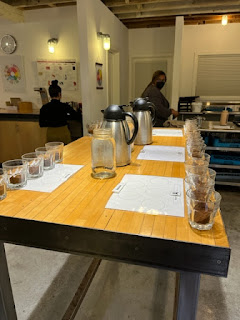June 14, 2022
It's nerve-wracking, no way around it, but a dozen of us coffee professionals found our way to Atlas Coffee Importers in Seattle, Washington last Friday, June 10, 2022, for an Arabica Q Grader calibration. We submitted ourselves to scrutiny by our instructor and comparison to our peers to see if we are qualified to be dubbed again as "licensed Q Graders" -- coffee tasters who can be trusted to identify defects and describe coffees using internationally accepted language and scoring. Ultimately, to be qualified to evaluate fair prices for coffee.
The good news: I passed!! But there's a lot more behind this story.
I first attempted to become a Q Grader in 2011 with Kelly Peltier-Amoroso at SCA's (former) office in Long Beach, CA. I remember it well. She was a great instructor, but as is common on "the first attempt", I failed about 5 of the required 21 sensory tests. I paid for and traveled to re-take exams and eventually successfully passed all tests in 2013. Since you have to re-calibrate every three years to stay certified, in 2022, I am on my third calibration. I failed my first attempt in October 2021, when I tried to calibrate immediately following SCA New Orleans. I needed to practice identifying "CQI defects". The only tastes that qualify as defects at CQI are phenol, ferment, mold and potato.After I scheduled my re-calibration for June 10, I started practicing in April. I bought 'low grade' specialty coffees and a few commercial grade coffees. I started brewing and tasting cups next to each other. At first I used sets of two and three (for ease and speed), and towards the end, I set-up sets of five to be ready for the exam. In May I started spiking a cup with my hacked "recipes" for defects. Phenol = Maxwell House Light Roast; Ferment = brine from sauerkraut, etc. Thanks to family members for helping me with "cup mixing" to create blind tests!
I got in touch with long-time coffee friend and customer, Teresa Pilarz, founder of Espresso Elevado, who kindly leant me her Le Nez du Cafe set. I practiced intensely with eight of the vials of "bad smells".
What helped the most was advice and tips on defect "detection, identification, description" from Todd Arnette, CQI's director of education. I wrote to him after my unhappy result in October 2021, explaining what I was pretty sure had been my downfall (defect identification), and appreciated his support.
My instructors for Q training have also been supportive. Drew Billups, director of education at Atlas, was awesome. Other previous instructors include Jodi Dowell, Rob Stephenson and, as mentioned above, Kelly Peltier-Amoroso.

